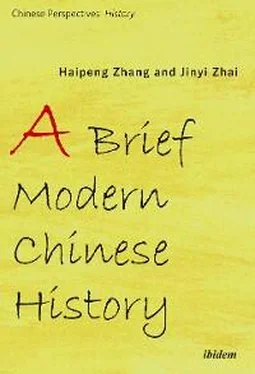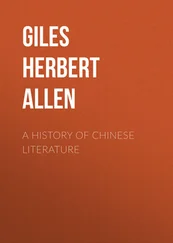Something unexpected occurred in the leadership of the Nanjing-based Heavenly Kingdom of Great Peace. In June, 1856, the Taiping Army destroyed the Qing army’s Southern Barracks, successfully reversing the setbacks suffered, but it was still unable to guarantee the political stability of the Taiping government. After establishing its capital in Nanjing, the government’s innovative style of politics was gradually wound up and, regrettably, it reverted to feudal relations. The original brotherhood, comprising the leaders and their top aides, was replaced by a rigid hierarchy headed by the monarch. In these conditions, the contradiction that had developed between Hong Xiuquan, the Heavenly King, and Yang Xiuqing, the East King, grew increasingly acute. Hong did everything possible, including practicing traditional rites and proclaiming conventional Confucianism, in order to strengthen his political supremacy. Despite these efforts, however, Hong was unable to prevent Yang from posing a challenge. According to the early devotional practice of the God-Worshipping Society, which laid the organizational foundation of the Taiping Rebellion, Yang had the ability to speak on behalf of God, and held many prestigious religious titles, thus making him religio-politically superior to almost all others. Many senior officials and generals, even Hong, the Heavenly King, were humiliated, bullied and punished by Yang. A significant number detested the imperious East King. 14The growing number of grievances finally brought about a serious internal conflict in August, 1856, when the Taiping Army crushed Qing’s Southern Barracks.
Just at that moment, Yang forced Hong to confer a much more prestigious title on him. Speaking with mysterious authority on behalf of God, Yang said that he should be given the title of Wansui , meaning Long Life, the grandest title that could be given by the supreme leader. Yang frequently used this special title to enforce obedience to himself, and this had a serious impact on Hong’s authority. As a result, Hong secretly summoned Shi Dakai, the Wing King, and Wei Changhui, the North King, to Nanjing. On the morning of September 2, 1856, Wei and his troops attacked the Mansion of the East King and killed Yang and his entire family. The situation in the following two months grew worse as Wei continued to indiscriminately kill innocent people. When arriving in Nanjing, Shi, who had just fought in Hubei, retaliated against Wei’s brutality and abuses. Infuriated, Wei attempted to murder Shi. When informed about this, Shi had to flee under cover of darkness. However, Shi’s family were all put to death. Five months later, Hong executed Wei and his adherents, putting an end to the carnage.
Shi was then summoned by the Heavenly King to help him. However, Shi soon grew disillusioned with Hong’s unfounded suspicions. In June, 1857, Shi soon decided to form his own army and left for Sichuan with 100,000 or 200,000 men. By departing, Shi left Nanjing in dire straits, and also signed his own death warrant. When leaving Nanjing, Shi was so disheartened that he even wanted to disband his troops. Later he was of slightly better cheer. Even so, his actions were still impetuous and aimless. Three years later, Shi retreated to Guangxi and many of his followers abandoned him. The core of Shi’s army finally (re-)joined the Taiping Army in Jiangxi. Shi had to organize a new army in Guangxi. In 1861, Shi and his new troops left Guangxi, hoping that they could capture Sichuan and create their own kingdom. However, Shi failed twice. Two years later, however, Shi entered Sichuan via Yunnan. In May, 1863, Shi was defeated by the Qing army at the Anshunchang ferry and then captured. One month later, Shi, at the age of 33, was executed in Chengdu.
The bloody events that took place in Nanjing fundamentally changed the situation. Before Nanjing, the Taiping Army had taken roughly the whole of Jiangxi and Anhui and parts of Hubei and Jiangsu, giving them a military advantage. After this, the Xiangjun captured Wuchang and Hanyang, two strategic cities, and made Hubei their central base. After Shi Dakai’s mistake, the Taiping troops in Jiangxi were completely destroyed one after the other. The strategic city of Jiujiang then fell into the hands of the enemy in May, 1858. During this battle, 17,000 soldiers’ lives were lost. However, in October, Qing recaptured Jiangxi as well as the strategic cities in northern and southern Anhui. The Qing army in Jiangsu rebuilt the destroyed Southern and Northern Barracks. The reconstructed Southern Barracks then intensified their attacks on Nanjing and in January, 1858, Qing’s troops approached Nanjing, the Heavenly Capital.
However, Qing had to expend its efforts on responding to the nationwide peasant uprisings and the Second Opium War, and this gave the Taiping Army some breathing room. Hong tried his best to rebuild the army by promoting young, capable generals. Among five of the leading young generals, Chen Yucheng, Li Xiucheng and Li Shixian were the most excellent and the leadership of the Taiping Army was reinvigorated.
One of Hong Xiuquan’s younger cousins, Hong Rengan 洪仁玕 (1822–1864), returned at this time. The younger Hong had been studying in Hong Kong, where he learned about Christian theology and Western sciences. In 1858, he was in Nanjing and when his elder cousin heard of this, he invited him to join the leadership of Taiping government. The younger Hong prepared a new political program known as New Governance (资政新篇) for the Taiping government. This four-part program focused on the reform of the system of manpower, the transformation of old customs and habits, the adoption of capitalist socio-economic policies, and the promotion of a legal system. The young Hong’s socio-economic program set the stage for what would lie ahead in the peasant revolution. In order to promote capitalist development, he suggested that the Taiping government publish newspapers, set up autonomous organizations, create modern industries and international trade. The New Governance was distinct from the 1853 Land Law of Heavenly Dynasty , which advocated for an egalitarian kingdom with a peasant economy. The 1859 New Governance , on the other hand, argued for a capitalist kingdom as the younger Hong realized that capitalism would most likely triumph over feudalism. 15After reading his younger cousin’s program, the elder Hong wrote very detailed instructions and comments agreeing with most of the younger Hong’s suggestions. Here lay the possibility of a fundamental transformation of the Taiping Rebellion. Unfortunately, due to the endless wars, the New Governance could not be put into practice. The younger Hong and his political program were not able to substantially influence the politics of the Heavenly Dynasty.
At this time, the Taiping Army had successfully rebuilt itself. 16They contacted the Nian army, which was fighting in the northern region of the Yangtze River, and asked for their support, which they granted. The Taiping Army then won a series of victories. In September, 1858, it destroyed Qing’s Northern Barracks and, two month later, annihilated more than 6,000 soldiers of the Xiangjun. The following March, they again destroyed the Southern Barracks and freed Nanjing. Even Zeng Guofan, the founding leader of the Xiangjun, had to acknowledge that the second destruction of the Southern Barracks was the Taiping Army’s pièce de résistance . 17Soon the Taiping Army headed east and attacked wealthy Suzhou and Changzhou. In the space of two months, a number of Qing’s high officials and generals were killed in battle and 50,000–60,000 Qing soldiers surrendered to the Taiping Army. However, when attacking Shanghai, the joint Anglo-French forces attacked the Taiping Army, claiming the lives of several hundred Taiping soldiers. Li Xiucheng, then the leading general of Taiping Army, remained under control and ordered his troops to withdraw from Suzhou.
Читать дальше












